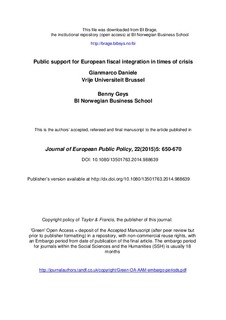| dc.contributor.author | Daniele, Gianmarco | |
| dc.contributor.author | Geys, Benny | |
| dc.date.accessioned | 2014-11-06T10:49:12Z | |
| dc.date.accessioned | 2015-08-04T11:24:59Z | |
| dc.date.available | 2014-11-06T10:49:12Z | |
| dc.date.available | 2015-08-04T11:24:59Z | |
| dc.date.issued | 2015 | |
| dc.identifier.citation | Journal of European Public Policy, 22(2015)5:650-670 | nb_NO |
| dc.identifier.issn | 1350-1763 | |
| dc.identifier.issn | 1466-4429 | |
| dc.identifier.uri | http://hdl.handle.net/11250/294515 | |
| dc.description | This is the authors’ accepted, refereed and final manuscript to the article published in | nb_NO |
| dc.description.abstract | The current economic crisis has triggered fierce debates among policy-makers and the media across and within European countries about the need for a closer European Fiscal Union. Using a novel dataset derived from the Eurobarometer surveys, this article investigates European citizens’ opinions towards such fiscal integration. We find that both country-level variables (such as expected country-level costs/benefits) and individual-level variables (such as distrust towards EU institutions, ideology and altruism) have significant explanatory power. We also uncover a notable intra-generational divide across young citizens of Euro creditor and Euro debtor countries, and show that this reflects their varying expectations regarding the future costs and benefits of fiscal integration. This demonstrates that the same demographic groups in different countries may have widely varying positions towards fiscal integration. | nb_NO |
| dc.language.iso | eng | nb_NO |
| dc.publisher | Taylor & Francis | nb_NO |
| dc.title | Public Support for European Fiscal Integration in Times of Crisis | nb_NO |
| dc.type | Journal article | nb_NO |
| dc.type | Peer reviewed | nb_NO |
| dc.date.updated | 2014-11-06T10:49:12Z | |
| dc.source.journal | Journal of European Public Policy | nb_NO |
| dc.identifier.doi | 10.1080/13501763.2014.988639 | |
| dc.identifier.cristin | 1170527 | |
| dc.description.localcode | 2, Forfatterversjon | nb_NO |
